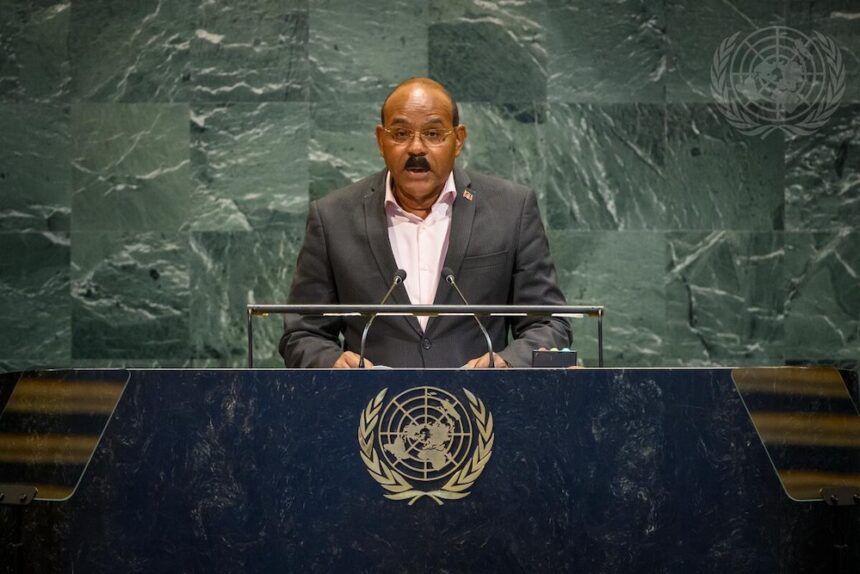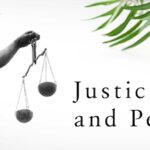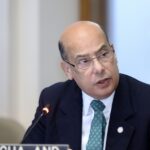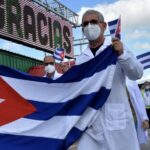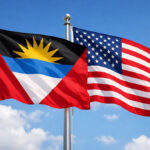Statement by
The Honourable Gaston Browne
Prime Minister, Minister of Finance, Corporate Governance and Public Private Partnerships
of Antigua and Barbuda at the General Debate of the 80th Session of The United Nations General Assembly
in New York on Friday 26th September, 2025
Madam President, Secretary-General, Excellencies,
Antigua and Barbuda speaks as a small micro state on the frontline of a climate crisis – exposed to grave shocks and with restricted access to affordable financing.
The fact that my country’s economy is among the fastest growing in the Caribbean and enjoys a high level of human development; it owes little to the global financial system, and even less to the global effort to curb climate change.
While there have been benefits, neither have helped to achieve the transformation that they promoted.
Yet my people know that a brutal hurricane could destroy the progress they have achieved in just a few agonising hours.
We have lived this reality before; each year we fear we may live it again.
Therefore, while my small country readily agrees that the nations of this world would be “better together,” as this year’s theme proclaims; we must also remind this Assembly that – eighty years after the Charter – “better together” remains an aspiration, devoutly to be wished and yet to be achieved.
Madam President, our world is at an inflection point.
A retreat from multilateralism, from the tenets of international law, and from respect for human rights and freedoms; warns us that we have reached a pivotal moment for humanity.
The conflicts we witness; the disregard for human life; the refusal to lay down arms and engage in dialogue; the disrespect, neglect of the poor, the small, and the vulnerable – these trends sketch a dystopian future, more divided than together.
This, then, is precisely the moment, to resummon all nations to the Purposes and Principles of the Charter set down eighty years ago.
Without international cooperation, universal peace will not be achieved.
What humanity needs at this time, is not only peace, but compassion, solidarity, justice and love reigning in our hearts.
The climate crisis is not a weather forecast for small island states; it is our daily plight.
Shores retreat, reefs bleach, storms intensify, while droughts destroy crops and animals.
This is not fate; Science has proven that it is the product of sustained high emissions, which imperil small states and also damage the environment, economies, and health of the very nations that produce them.
Climate change science is not fraudulent and we ignore it to our own peril.
Madam President, we support a just, orderly energy transition.
A transition that caps; then fairly phases down and ultimately phases out the fuels that drive this destruction, without sacrificing energy security or development.
We favour a fair carbon levy on the heaviest emitters, public and private, with proceeds directed to adaptation, loss and damage, and resilience.
The Loss and Damage Fund must operate as promised: predictable, front-loaded financing, that arrives when disaster strikes; disbursed timely, on objective triggers, so that help comes at the speed of need.
But finance must be fair before a storm hits.
Right now, the inequitable international financial system, makes the most vulnerable countries pay the highest price, just to protect themselves.
These climate disasters force us to borrow expensively to rebuild.
Consequently, debt swells and resilience stalls.
We call, yet again for full adoption of the Multidimensional Vulnerability Index across international financial institutions, so that exposure to shocks opens access to concessional terms.
Lending should match climate horizons: long repayment periods, low fixed rates, sensible grace periods, and climate-resilient debt clauses, that automatically pause payments after verified shocks.
Local-currency lending windows would end the foreign-exchange penalty that deepens debt without adding value.
That, at least, would be a step along the road to justice.
Madam President, for islands like mine, the ocean is not scenery; it is the source of food and jobs, and the opportunity for new chances of growth and development.
But it must be protected.
We urge decisive action against illegal, unreported, and unregulated fishing; plastics that choke reefs; and pollution that steals mangroves.
As custodians of vast Exclusive Economic Zones, small islands offer partnership and stewardship.
Let us back robust global plastics and fossil fuel non-proliferation treaties; expand blue-carbon finance for mangroves and seagrass, and make maritime domain awareness, and the provision of satellite and data-sharing services, standard support for SIDS.
Until independent science proves no serious harm, we support a moratorium on seabed mining.
No one should mortgage the ocean floor to pay short-term bills.
Madam President,
Law must be our guardrail.
Consequently, Antigua & Barbuda and Vanuatu have sought and successfully obtained from ITLOS & the ICJ, legal clarity on climate obligations.
Legal advisory opinions now define duties of states to prevent harm and protect the most exposed.
If major emitters will not cut greenhouse gas emissions in line with science, victim states must retain the right to pursue appropriate legal remedies, consistent with international law, for climate harm.
That is not hostility; it is the logic of the law; It is justice.
Antigua & Barbuda supports UN reforms to include the participation of Small Island States having a regular, structured voice, in Security Council deliberations on climate-related security risks.
Excellencies,
Last year, the world came to Antigua and Barbuda for the Fourth International Conference on Small Island Developing States and adopted the Antigua and
Barbuda Agenda for SIDS – ABAS — a ten-year contract for resilient prosperity.
We launched the SIDS Centre of Excellence on Antigua, with a Global SIDS Data Hub, to turn promises into projects: better data, more investments, and the achievement of debt sustainability.
Those who invoke partnership should help fund and implement it.
If “better together” means anything, it means delivering where need is greatest and fiscal space narrowest.
Small states are not asking for charity.
We ask for equity, for finance that fits risk, for peace grounded in law, for rights that protect the vulnerable.
We are seeking the chance to protect our lives and preserve our livelihoods.
In a similar vein, Madam President, we assert that Justice cannot be complete without addressing historic injustices.
In the Caribbean the stain of colonialism, slavery and native genocide, is still branded in the legacies we were left.
The Trans Atlantic slave trade is the most heinous crime committed against humanity. We seek reparatory justice from those who committed these atrocities; who kept our forebears in physical chains and mental slavery for hundreds of years.
Colonialism and slavery have imposed the rigid trade routes with which we now live; the underdevelopment from which we are seeking to rise up; the constraints that make us suppliers and not producers.
Reparatory justice is not charity; it is principled restitution for wealth extracted, for unpaid labour, barbaric killings and physical abuse endured by our forebears.
We invite partners to engage this agenda in good faith, as part of building a fairer global economy for all.
Madam President.
In the Middle East, we insist that Israeli hostages be released by Hamas – civilians must not be made pawns in any conflict.
At the same time, we condemn the forced removal of people in Gaza from their homeland and the genocide that has occurred there.
Humanitarian access must be guaranteed, and the protection of civilians made non-negotiable.
Antigua and Barbuda maintains its position in favour of a two-state solution – Israel and Palestine, living side by side in security and dignity, consistent with United Nations resolutions.
We regret that the Chairman of the Palestine Liberation Organization was denied a visa to attend this Assembly in person.
While we welcome the Assembly’s decision to allow him to address this session by video; we remind everyone that the United Nations is, above all, a chamber for voices to be heard, not to be muzzled, especially during times of war and conflict.
Shutting out voices does not shut down underlying issues.
Similarly, in Europe, the war in Ukraine must end in peace and with justice, not in the battle fatigue of the besieged.
We urge a return to diplomacy anchored in the Charter and call on all states to refrain from actions that prolong conflict, or profit from it.
Peace with law is the only peace that lasts.
Madam President, I come now to Haiti.
This beleaguered country demands sustained attention, not cycles of improvisation.
Funding has arrived in fits and starts while suffering has grown.
We support a single, Haitian-led plan, executed under a single Security Council mandate and financed through a single, transparent Haiti Fund, aligning the United Nations, the Organization of American States and the Caribbean Community, behind one budgeted programme with public accountability.
Disbursements should follow results such as: roads retaken from gang control, extortion stopped, arms and illicit finance interdicted, civilians protected, and essential services restored.
Haiti needs one mandate, one Haitian-led plan, one fund — accountable and transparent.
We urge every member of the Security Council, to support the proposed Resolution on increased security assistance for Haiti that is now before it.
Action is long overdue; the Council must act to help Haiti and its long-suffering people.
Madam President, we also address the conduct of counter-narcotics operations in the Caribbean Sea.
Without judging facts not before us, including reports of lethal incidents off the coast of Venezuela, we restate a simple principle: the fight against drug trafficking must rest on cooperation and law.
Interdictions should proceed under clear legal authority and rules of engagement that minimise risk to life, respect for sovereignty and the law of the sea, and prompt information-sharing and review.
Whereas, Antigua and Barbuda stands ready to work with all partners against traffickers, we are concerned with the build up of military assets, including a nuclear submarine, indicating the possibility of military conflict.
We remind everyone that our hemisphere should be respected as a zone of peace, not a theatre of military conflict.
Madam President, we also address Cuba.
For more than six decades, the Cuban people have lived under a suffocating trade embargo, and Cuba remains listed by one country as a State Sponsor of Terrorism.
We all know that this classification is a hoax.
It is in our hemisphere’s interest to move towards normalised relations, consistent with sovereign equality.
Normalization is not a concession; it is a pathway to dialogue and to fashioning a way forward that ensures regional stability through negotiated, binding agreements.
Now, Madam President, I come to issue of public health that affects every family, everywhere in the world. Mental Health.
More than one billion people are now living with mental health conditions, yet median government spending remains at about 2% of health budgets.
Treatment gaps are widest in low- and middle-income countries, fueling a growing mental health epidemic among them.
Suicide claims nearly one million lives each year.
It is among the leading causes of death for young people.
Last June, when Antigua and Barbuda hosted the OAS General Assembly, we secured a hemispheric resolution on improving mental health in the Americas, with practical steps on national plans, community-based services, parity in coverage, workforce development, and digital access.
Mental health is not a curse; it is a solvable challenge.
Let me remind us all, mental health is a human right; sanity is the people’s right.
When we invest in mental health, people recover and re-enter community and work—as a consequence, countries rise.
Antigua and Barbuda is committed to working on a United Nations resolution treating mental health as essential to development.
Other non-communicable diseases such as, hypertension, diabetes and various forms of cancer, account for 75 percent of all deaths in the Caribbean. They are the most significant cause of death globally, creating a silent global health crisis.
We need to urgently address this crisis with the same urgency of infectious diseases.
Madam President, what we have set out here is the minimum needed to honour the Charter at eighty.
The storms are stronger; the debts are heavier; inequity is wider, yet the remedies have not changed.
Let us pursue a new sustaining dispensation of rules over power and might, fairness over advantage and people over profit, in the interest of humanity.
Madam President, Excellencies,
If this world is truly better together, let us be accountable together, and be accountable to all.
Not only to a few nations, but to all nations.
Not only to the present generation, but also to the generations that follow.
Not only to those who wield power, but to those against whom power is wielded.
Thank you.

